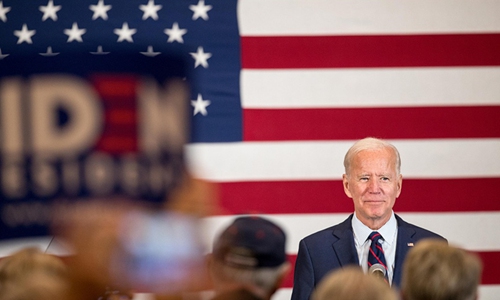Biden faces daunting job to restore cracked alliance system
By Zhang Jiadong Source: Global Times Published: 2020/11/29 14:53:40

US President-elect Joe Biden Photo: VCG
Relations between the US and its allies have been under constant strain since the end of the Cold War. This strain worsened under the Trump administration, and has changed in some fundamental ways.
The first change pertains to international affairs. During the Cold War, the US maintained a stable alliance system with its Western allies to hem in the Soviet Union.
After the Cold War ended, there was no longer a need for a staunch US-Western system of alliances. Indeed, European countries and Japan were no longer willing to obey the commands of Washington as their sense of sovereignty and strategic autonomy was on the rise. Meanwhile, the US was no longer willing to shoulder the military burdens as it did during the Cold War, causing a long-lasting dispute between them.
After the financial crisis of 2008-09 then after 2012, China's robust economic growth seemed to have set off alarm bells in Washington. It began construing China in a negative light in much the same way it did with the former Soviet Union.
However, many European countries and Japan, despite having the similar ideologies and values with the US, did not share the same military and economic strategies in the US strategy of containing China.
The second change took place with US domestic politics. The Republican Party has a long tradition of advocating isolationist foreign policies. Its philosophy seeks to "act for itself and not for others." Indeed, during WWI and WWII, the Republicans opposed US participation in the League of Nations or joining the anti-Fascist movement. They have also been the leading voice to undermine US international relations with unilateral action.
During the presidency of George W. Bush, he enforced unilateralism in the Iraq war, and strained relations with US allies such as Germany and France. It took his successor Barack Obama some major efforts to restore the broken alliance. When President Donald Trump took office, he continued Bush's neglect of the alliance system, and has gone far beyond that. This greatly undermined the US international image and the ideological foundations of the alliance system it had worked so hard to create since the end of WWII.
After Biden takes office in January, he is expected to restore US relations with the allies and reinforce multilateral mechanisms. He may reiterate his support for the European Union, and try to rejoin the Paris Agreement and the World Health Organization. He may even reengage with Tehran to regain control of the Iran nuclear issue. But no matter how hard Biden tries, he will still face many challenges.
To begin with, Biden will find it hard to change the reality that the US, Europe and Japan lack a common enemy. Only China seems to be "qualified" to play the role of their "enemy." Yet China shares many goals and similarities with the West.
China has made continuous efforts to reform and open up. It recently signed the Regional Comprehensive Economic Partnership, and is working on the promotion of the China-Japan-South Korea free trade agreement. It seeks to further integrate with the world's economic system, and has found an efficient approach to defuse the US strategic isolation pressure.
Moreover, Biden won't be able to dispel US allies' doubts about Washington. The US is no longer what it was. Trumpism not only is a product of Trump himself, but has won broad supporters from across the country. If COVID-19 did not occur, Trump would definitely have been reelected. Trump lost the election, yet he still won nearly half of votes. US allies won't place their hopes of totally improving ties with the US as the pandemic controls remain unpredictable.
Last but not the least, Biden has limited domestic political resources. He has not won both the US Senate and the House of Representatives by an overwhelming advantage. His adjustments in US foreign policies will turn out to be bumpy.
The world has changed, the US has changed, and the way the world sees the US has also changed. Once the friendship between the US and its allies is hurt, it can be partially repaired. But it cannot be restored to its original state. The cracks will not go away.
The author is a professor at the Center for American Studies, Fudan University. opinion@globaltimes.com.cn
Posted in: VIEWPOINT,CHINA-US